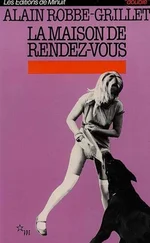He was about to knock on the door panel when he noticed that one of the mahonia bushes was about to die, if not dead already; although the other bush was already showing its buds, the one on the right bore only a few brownish leaves at the ends of the stems, half-shriveled and spotted with black.
The door was not bolted. Mathias pushed it open and heard voices quite close by as he made his way down the hallway—it sounded like a vehement argument. He stopped.
As soon as he had released it, the door slowly returned to its original position without making the slightest sound. The kitchen door was ajar.
“Well?… Can’t you say anything?”
“Oh, leave the boy alone. He told you he came straight here and waited for you out in the courtyard!”
That was the old country woman’s voice. She sounded out of patience. Mathias took a step forward, carefully setting down his heavy shoe on the tiles. Through the opening, which was three or four inches wide, could be seen only one end of the table, covered with an oilcloth patterned with small, many-colored flowers, on which were lying a pair of glasses, a paper-knife, and two identical stacks of clean white plates, side by side; behind them, sitting bolt upright on a chair beneath a calendar tacked to the wall, was a young man holding himself perfectly motionless, his hands on his knees, head high, eyes fixed. He might have been fifteen or sixteen. Although his lips were not moving, it was easy to tell from his shiny, rigid face the importance of his role in this scene. Other people were talking and moving about in the rest of the room. Then came a man’s voice: “He told me…. He told me! He was lying, as usual. Look at that mule’s face. You think you know what’s going on inside that head? The boy’s not all there…. Still, he could answer a question when he’s asked!”
“But he’s told you again and again…”
“He sits there on that chair as if he had lost his tongue!”
“Because he’s already told you what he had to say! You always start the same thing over and over.”
“Oh, of course, I’m the one who’s crazy!”
Heavy steps resounded on the cement, a man’s steps (doubtless those of Robert Marek—who else could have been talking that way? ). But nothing crossed Mathias’ field of vision, the vertical strip remained unchanged: the cement squares of the floor, the table leg, the edge of the oilcloth with the pattern of little flowers, the steel-rimmed glasses, the long paper-knife with a black handle, the pile of four soup plates and the second pile just behind it, the upper part of the young man’s body, a part of the back of his chair to the left, his frozen face, pinched mouth, fixed eyes, the illustrated calendar on the wall.
“If I knew he was the one who did it…” the father’s voice growled.
The old woman began to cry. Amidst her wails and pleas for divine compassion, several words recurred again and again, a leitmotif: “… a murderer… murderer… he thinks his son is a murderer…”
“That’s enough of that, Mother,” the man shouted. The wailing stopped.
After a moment of silence, punctuated by the sound of his steps, he continued more deliberately: “You told us yourself that this—what did you call him?—this watch salesman had stopped here while I was away and found no one in the house. If Julian had been sitting on the doorstep, the way he claims he was, the man would certainly have seen him.”
“He might have gone away for a minute… did you, darling?”
Mathias felt a sudden impulse to laugh, so unsuited to this impassive countenance was the word “darling,” used by all the islanders in speaking to children. His efforts to contain himself prevented him from hearing an exchange in which he nevertheless made out a new voice—that of a younger woman. Yet the boy had not moved a muscle; perhaps these words did not really concern him after all, perhaps the others were interrogating someone else. This second feminine voice might be the boy’s mother…. But no, she was away on a trip. Besides, the father had brutally silenced the importunate interruption; he continued his accusation: “First of all, Julian says he didn’t leave the door. So he lied in any case…. The brat can’t even keep his job in the bakery! Liar, thief, murderer!…”
“Robert! Are you crazy?”
“Yes, that’s right—I’m the one who’s crazy…. All right, you, are you going to answer—yes or no? You were out there, weren’t you—out on the cliff, when that fellow came here; you had just time enough to get back before I did—without taking the road, since your grandmother didn’t see you…. Well, say something, stubborn! You met the little Leduc girl, didn’t you—you tried something with her? Oh, I know she wasn’t a saint.… All you had to do was leave her alone…. And then? You were fighting? or what? Maybe you made her fall without meaning to? You were at the edge of the rock, and in the struggle.… Or was it for revenge, because they threw you off the pier the other night? Well?… You’re going to say something or I’ll break your head for you!”
“Robert, you’re losing your temper again, you’re…”
The salesman instinctively stepped back into the shadow: a sudden thrill of warmth ran through him. He realized that a change had just occurred (but when?) in the relation between the plates and the calendar, in the face directly opposite—now staring at his own. Immediately recovering his composure, Mathias walked deliberately toward the door, while the father’s voice repeated louder and louder: “Then let him answer, let him answer!”
“Someone’s there,” the young man said.
Mathias exaggerated the noise his shoes made on the tiles and knocked with his ring on the half-open door. In the kitchen all sound had immediately ceased.
Then Robert Mareks voice said: “Come in!” and at the same moment the door was violently opened from inside. The salesman stepped forward. Everyone came toward him. They all seemed to know him: the old woman with the yellow face, the man in the leather jacket, even the young woman washing the dishes in a comer; half-turned toward the door, she had stopped in the midst of her work, a pot in her hand, and greeted him with a nod. Only the boy on the chair had not moved. He merely moved his eyes a little, in order to keep them fixed on Mathias.
Mathias, after having shaken all the hands held out to him, without succeeding despite his happy “hello’s” in relaxing the tension in the air, ended up by walking over to the calendar tacked to the wall: “And there’s Julian, my word! How he’s grown! Let’s see… how many years is it?”
“Can’t you stand up when you’re being spoken to?” shouted the father. “A real mule-face! That’s why we were shouting a little, a minute ago: he’s got himself fired from the bakery—yesterday morning—where he was working as an apprentice. I’ve half a mind to send him off as a cabin-boy if this goes on…. Always making trouble…. Last week he got into a fight with a drunken fisherman, fell in the harbor, and almost drowned…. That’s what we were shouting about a minute ago. We were shaking some of the fleas out of him…”
Julian had stood up and was staring at his father. Then he turned and looked at the salesman. A vague smile hovered at the corners of his tightly-closed lips. He said nothing. Mathias did not dare hold out his hand to him. The wall was painted a flat ochre color of which the top layer was coming off here and there in polygonal scales. The picture on the calendar represented a little girl, her eyes blindfolded, playing blind-man’s buff. He turned toward the grandmother: “And where are the children? I’d like to see them too…”
“They’ve gone back to school,” Robert Marek said.
Читать дальше












